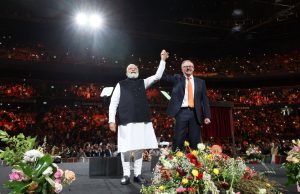In his Annual Threat Assessment in 2021, the head of the Australian Security Intelligence Organization (ASIO) revealed that the agency had removed a “nest of spies” operating in the country. At the time, most people assumed these to have been Chinese spies, given the fractious relationship between Canberra and Beijing, as well as the Chinese Communist Party’s extraterritorial claims on all ethnic Chinese and targeting of Uyghurs and Tibetans.
However, this week it was revealed via anonymous security sources to The Washington Post, the Sydney Morning Herald and the Australian Broadcasting Corporation that these spies were operatives of India’s foreign intelligence agency, the Research and Analysis Wing (RAW). The sources stated that these operatives were interested in sensitive defense projects, airport security, and classified information regarding Australia’s trade relationships, as well as monitoring the Indian diaspora.
The revelations strike at the heart of one of the core features of Australia’s recent foreign policy initiatives – greater economic integration and security cooperation with India. Canberra has dedicated a lot of effort and diplomatic resources to enhance this relationship, which makes this undermining of trust a hindrance to those efforts.
Yet two features of modern India indicate that there was a certain inevitability to these actions, and these features may prove difficult for Australia to navigate going forward.
The first is that India’s emerging great power status comes with great power behavior. As its power increases, India’s interests and concerns expand, and its capabilities to reach into areas of the world where it previously couldn’t also expand. Great powers see their interests as more substantive than those of other countries. India is far from unique when engaging in this kind of thinking or activity.
This is one form of confidence New Delhi has displayed, but there is also another. With countries like Australia seeking to court India due to the wealth of opportunities it provides, New Delhi knows that actions like these won’t come with any significant consequences. This has been proved by Australian ministers seeking to downplay the incident when questioned about it. Alongside opportunities, the far bigger issue is the mutual geopolitical concerns that both New Delhi and Canberra share about China’s belligerence.
Of course, Canberra is most likely under no illusions that India will ever be the country that Australia – and the West more broadly – would ideally like it to be. India takes its strategic independence very seriously, and has a unique interest as a state of enormous internal complexity, and difficult regional relationships. This means that its external behavior will always be reflective of this, even with some present mutual commonalities.
The second feature of India’s behavior is the ascent of the Bharatiya Janata Party (BJP) to become the country’s overwhelmingly dominant political party over the past decade. That status looks to continue with elections currently taking place. The party’s ideological preoccupations have led to it being more interested in using New Delhi’s greater reach, and especially far more interested in the Indian diaspora than previous governments.
In particular, the BJP government has allegedly taken extrajudicial measures to target Sikh activists in Canada, with an alleged murder, and in the United States, with an alleged plot to murder. These activists are believed to have been advocates for a separate Sikh state, Khalistan. Granted, the Khalistani movement was a genuine security threat in the 1980s – with incidents like the bombing of Air India Flight 182 between Toronto and London – when separatist sentiment was high in Punjab. But nowadays the Khalistani movement is far more of a diaspora issue than an internal problem for India.
Yet, the BJP sees a certain amount of political mileage in making a bigger issue out of these activists, and has unfairly sought to tie issues like farmers protests in India to the movement. The authoritarian disposition of the BJP means that dissent is not easily dismissed. Even if this dissent has no real power, whether it is inside India or not, it needs to be squashed regardless.
Australia’s Indian diaspora has grown rapidly in the past decade, becoming the second largest foreign-born group, after those from the United Kingdom. This now includes a Sikh community of over 200,000 people. The growth of this diaspora is something that the BJP government is taking a keen interest in, although clearly a little too keen for ASIO.
Although Australia is a middle power of some capability, and a friendly nation to India, New Delhi perhaps does not see Canberra in the same league as itself any longer. What it sees as its own interests will be considered more important than respecting friendly norms. While Australia may remove any spies that it sees as overstepping the line, it is likely that more will return. Canberra will just be hoping that these lines don’t get pushed too far to disrupt Australia’s own broader economic and strategic interests with New Delhi.

































